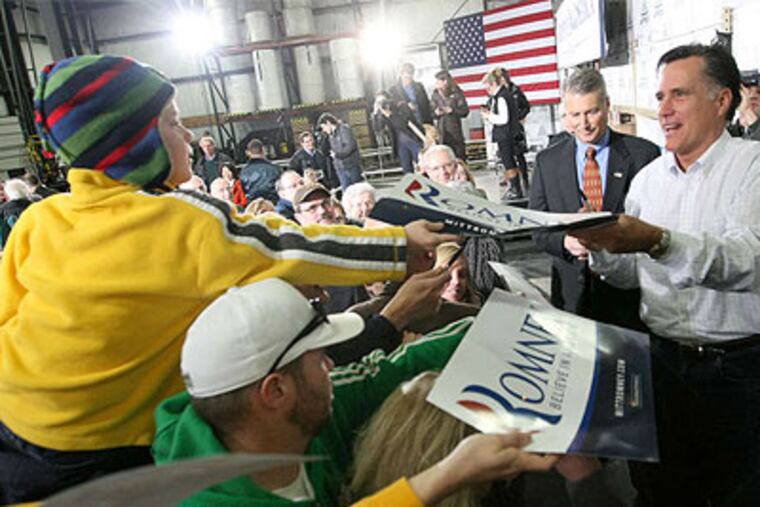Negative ads may decide Iowa
Gingrich, once the leader, has been the main target of the television attacks mounted by Romney and Paul.

WALFORD, Iowa - So far, a series of 13 televised debates has driven the storylines of the Republican presidential race, and on Monday the six major candidates each traveled hundreds of miles for a last burst of the retail campaigning that has earned this state its place at the head of the nominating process.
Yet in the end, what happens in Tuesday night's Iowa caucuses may be determined as much as anything by a deluge of negative television ads over the last two weeks, the nastiest media war in the memory of many political analysts and operatives here.
Former House Speaker Newt Gingrich, who had been leading in Iowa, has been the prime target. He has seen his poll numbers melt under sustained attack from two directions, namely former Massachusetts Gov. Mitt Romney and Texas Rep. Ron Paul. Romney has been relatively unscathed as candidates jockey to position themselves as his chief conservative challenger. Former Pennsylvania Sen. Rick Santorum's recent surge into the top ranks of the field has been helped in part because, not long ago, he was so far behind that nobody felt the need to nuke him.
The latest polls showed that Santorum, a favorite of social conservatives, Romney, and libertarian Paul all were within striking distance of victory.
Gingrich's campaign bus rolled into Schrader Excavating & Grading Co. Monday in this small town outside Cedar Rapids, where he railed against the negative turn of the campaign, hoping to spark a backlash.
"Iowa has the opportunity to send a message that we are sick of negative politics and cynical consultants," Gingrich told about 200 cheering Republicans in the company's equipment barn, flanked by a dump truck, a backhoe, and a tractor. "Refuse to vote for anyone who runs negative ads," he said.
There's little indication that voters are rebelling against the tactic, as Gingrich himself acknowledged earlier in Independence, where he appeared with Big Bud, the world's largest tractor.
"I don't think I'm going to win," Gingrich told reporters. "I think the volume of negativity has done enough damage."
At least $13 million has been spent on clogging Iowa's airwaves and cable channels with a welter of charges, many launched via the latest campaign-finance wrinkle: "super PACs" financed by individuals and interests whose identities have not been disclosed in most cases.
One of those groups, Restore Our Future, which supports Romney, has dropped $3.2 million on ads attacking Gingrich's "baggage," including a $300,000 House ethics penalty, the $1.6 million in consulting work he did for mortgage giant Freddie Mac, and less-than-pure conservative positions on climate change and immigration.
Paul's campaign has also pummeled Gingrich, while the Romney campaign itself has run gauzy "Morning in America"-style spots featuring cornfields, children, and factory workers.
Cheryl Hop admires how Gingrich has stayed positive in his own ads, but she has noticed that the attacks make it harder for her to win converts to the former speaker.
"It's done a certain amount of damage," said Hop, 52, a food broker from Cedar Rapids. "It's fascinating to listen to people talk. You hear people say the same three attack taglines over and over. So few educated people vote."
She volunteered for Romney in 2008 and was inclined to support him again, but "when he came out of the chute this time he was almost on a recorded loop from four years ago," Hop said. Gingrich is "brilliant . . . an encyclopedia" and a statesman, she said. "I would kill to see this man debate Barack Obama."
Bruce Eichacker had been supporting Gingrich, but said he is "concerned" that the former speaker's career baggage highlighted in the ads would probably doom him in the general election.
He'll vote for Romney at his caucus Tuesday night. "I think he's electable; he's Steady Eddie," said Eichacker, 63, an insurance agent from Amana.
On his television, the closing days of the Iowa campaign seem more negative than any he can remember. "It's terrible, just all day and all night negative," Eichacker said. "I hate to see this infighting among Republicans," he said. "I wonder if there's a better way to pick candidates."
How the Caucuses Work
Iowa Republicans will get the first crack at selecting a presidential nominee Tuesday.
Based on past patterns, a fraction of Iowa Republicans will attend the 1,774 caucus meetings held at 809 locations.
Each campaign may have one surrogate speak. Attendees cast their votes; the vote-counting is public.
Caucus officials transmit the results to state party headquarters in Des Moines, where the standings are announced. The first-place finisher won't be awarded official delegates because the votes are nonbinding.
The caucuses are open to registered party voters who will be at least 18 years old by the general election Nov. 6. Democrats and independents may participate; they would have to change their registration to Republican, which is allowed on the day of the event.
- Bloomberg News
EndText